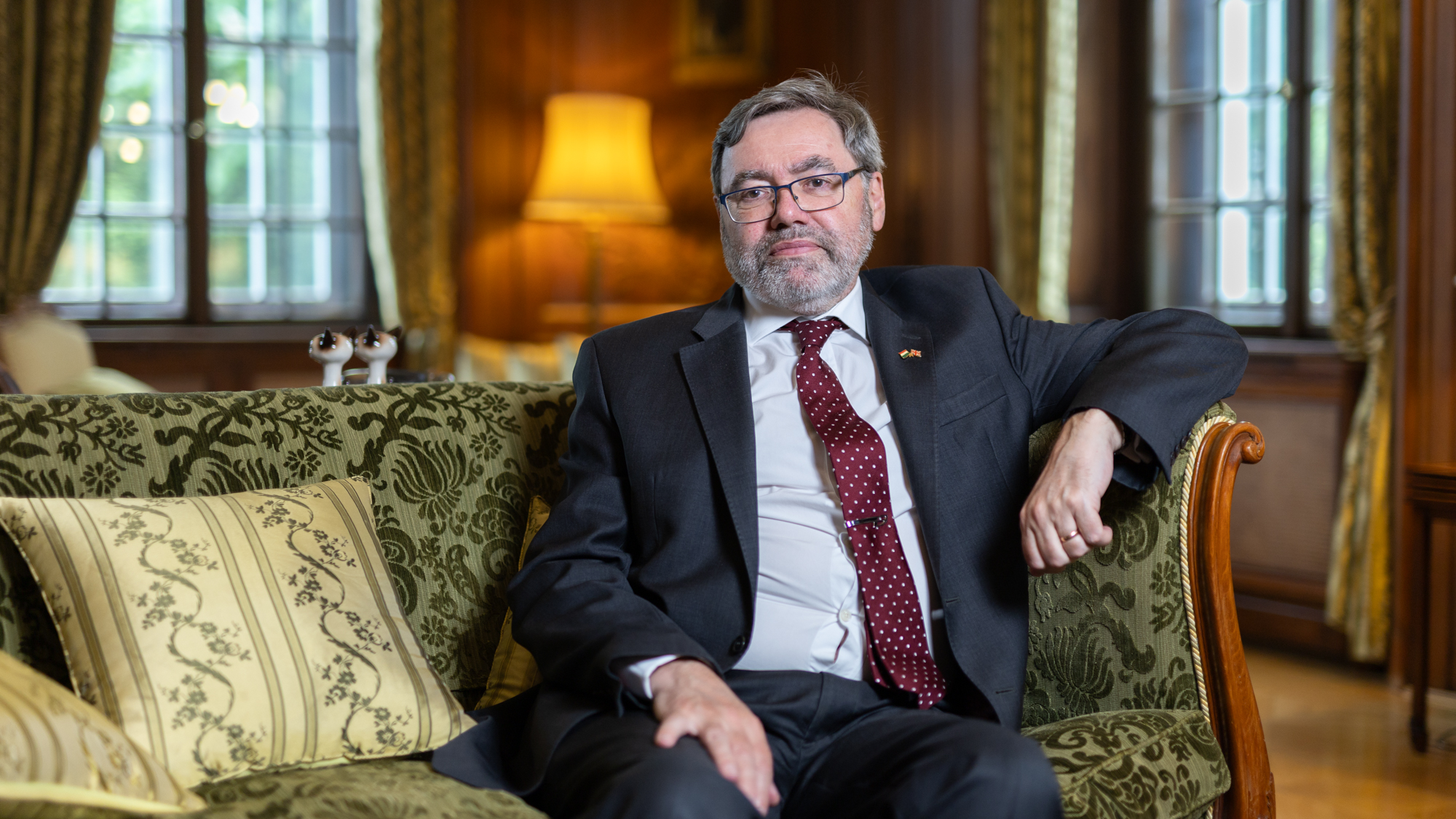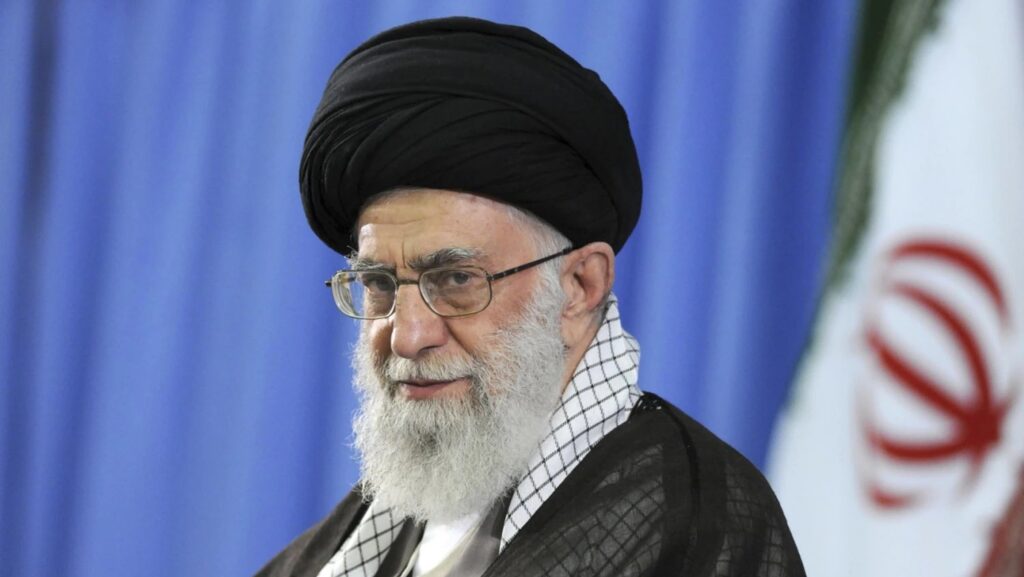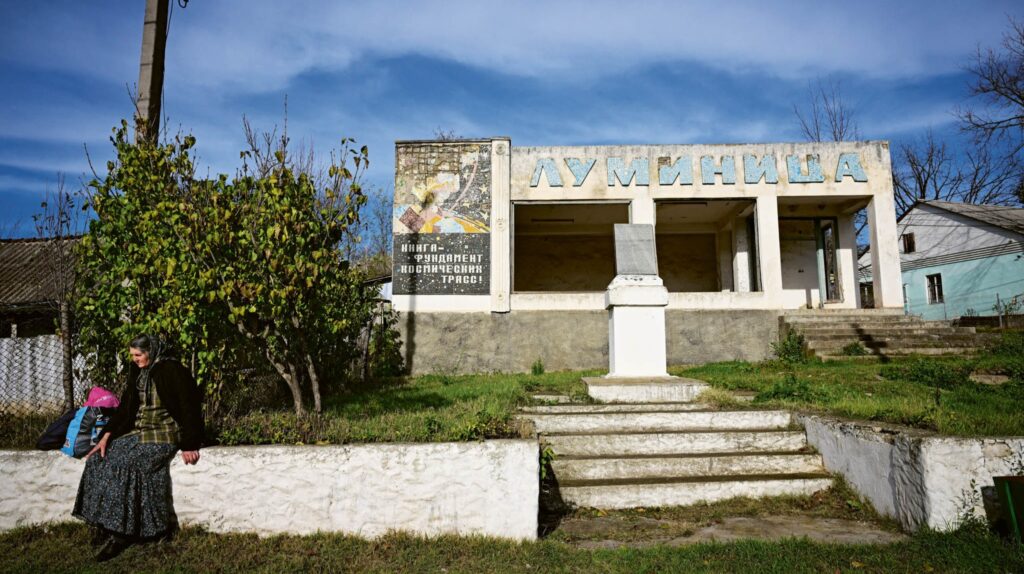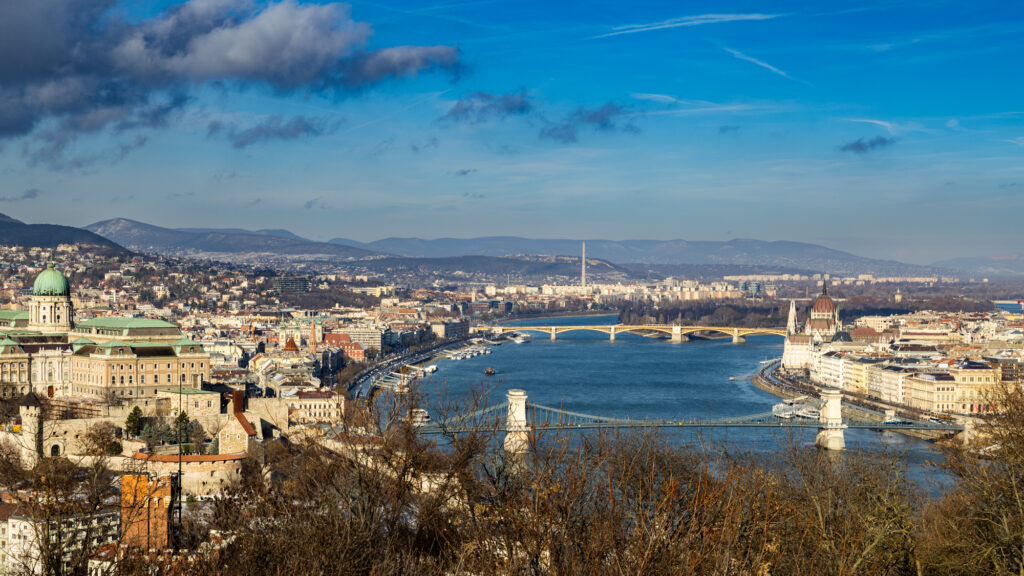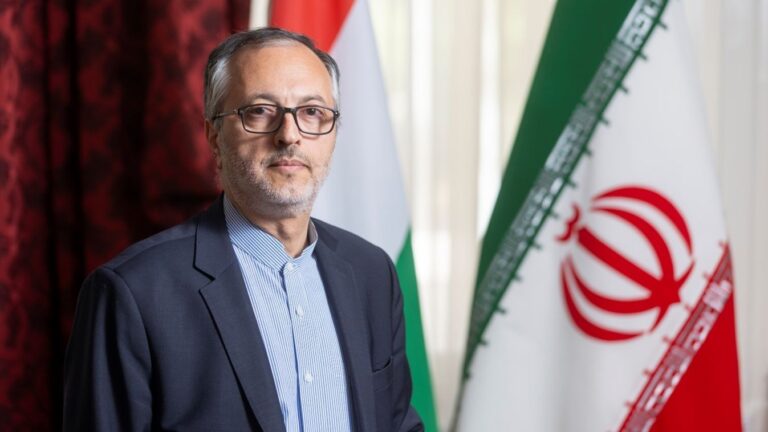Paul Fox is a British diplomat. He earned a BA in History at the University of Sussex and studied for a doctorate in Russian and East European Studies at St Antony’s College, University of Oxford. In 1987, he joined the team of the Ministry of Foreign Affairs as an analyst on Yugoslavia and served in New Delhi, Baku, and Bangkok in the 1990s. Between 2006 and 2010, he was consul-general in Warsaw, then head of the Afghanistan Department of the British Foreign Office, and deputy head of mission in Abu Dhabi and consul-general in Dubai. He was Minister Counsellor at the United Kingdom Embassy in Moscow for two years, and since September 2020, he has served as Ambassador of the United Kingdom to Hungary.
***
If there is an issue where the British and Hungarian positions diverge, it is the issue of Ukraine. Should Ukraine be an EU member in an accelerated procedure?
The British government’s policy on that has been clear for some time. We do believe that Ukraine has a European perspective. In terms of the speed of the process, we need to leave it to the EU. I don’t think it’s for us to encourage or to suggest a certain timeline, but we believe that it will be good for the EU, as well as for Ukraine, for it to be part of the EU. We accept that the process will take time, because joining the EU means you’ve got to meet all the criteria of European law.
According to the Hungarian government, with Ukraine’s accession, there would be a huge financial burden on member states, and it would cause serious economic damage to Hungary. Is this a legitimate consideration?
I think that argument could have been used in 2004 when Hungary and other countries that were formerly parts of the communist bloc joined the EU. I think there is greater strength in unity. I think bringing countries together brings benefits. And it would be a bit unfortunate once you’ve climbed the ladder yourself, to pull the ladder up after you, so nobody can follow. So, I’m not entirely sure that all those arguments necessarily stand up.
The Hungarian government’s interpretation of the Ukrainian conflict is that the EU, even if it is in the interests of Ukraine, supports the continuation of the war, while Hungary supports its conclusion. What is the British government’s opinion on the Hungarian ‘pro-peace’ position?
I don’t entirely agree with that analysis. I wouldn’t say that the UK is pro-war. We don’t want the war to continue. We share with Hungary a desire for peace, but it’s a question of what type of peace that is. My feeling is that if we had some sort of ceasefire or some sort of settlement which just freezes the conflict, that would be freezing it on Russia’s terms, it would legitimize their aggression and undermine the rules-based international order. But above all, it would just allow Russia to regroup and then return to complete the job. Because I think they’ve made it clear when it comes to Ukraine, that they don’t regard it as a real nation. They want to reabsorb it as part of Russia’s sphere of influence.
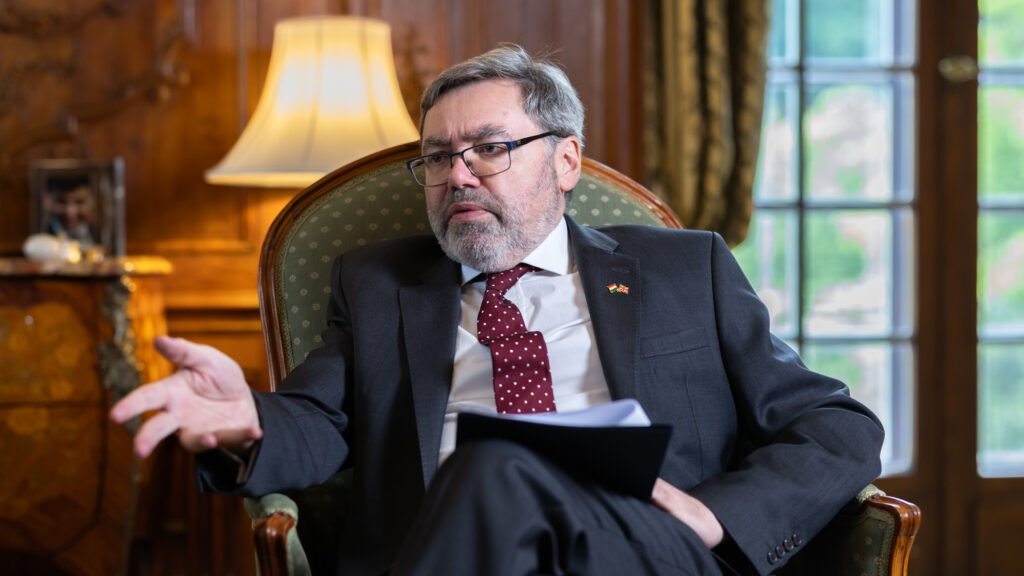
And then the question I have to ask is: Do they have ambitions limited to Ukraine? I’m not entirely sure that they do. So, we want peace, but an enduring and sustainable peace. London doesn’t have a war psychosis. We don’t have a pro-war mentality. The only place where there is a war psychosis is in Moscow. After all, they are the ones who, in a premeditated move, invaded Ukraine in a completely unprovoked attack. And I think we have to look at what they did in 2008 in Georgia and look at what they did in 2014 in Crimea, and again, in 2014 in Donbas, we need to consider if they will come back for more unless we stand up to them. So that is what motivates our support for Ukraine: to protect their sovereignty, to maintain their territorial integrity, and to ensure that aggression is not rewarded.
For what concrete reasons does the UK consider Russia a threat to Europe? Because you mentioned that Russia’s intention might be a bit more than Ukraine. Why?
You just have to look at their actions. Judge them by their words and judge them by their actions. If you look at the words, President Putin produced an article in the summer of 2021 in which he laid out exactly what his ambitions were, which was to regard Belarus and Ukraine as part of Russia’s sphere of influence, being strongly linked to Russia, both culturally and historically, and suggesting that they didn’t have much of a right to exist as sovereign nations.
If we judge them by their actions, then look at what they did in 2008, look at what they did in 2014, also look at what they’re up to now when it comes to hybrid activities, cyber-attacks in the Baltic States and elsewhere. So, I think they do pose a challenge. They’ve already violated international law, but it’s an approach which is also undermining the security architecture of Europe, which has provided peace for decades. And if that security architecture is fatally undermined, then our security is undermined. So, it’s really important for us as allies to work together to ensure a united response to this challenge.
Do you really believe that the Baltic states, as former Soviet member states and parts of Russia’s sphere of interest, are in danger? Or maybe Poland?
Well, all I can say is that they feel threatened. That’s why they joined NATO in the first place, and that’s why they are bolstering their security and looking to allies. For example, Poland is now spending almost 5 per cent of its GDP on defence. If you look at what’s happening in the Baltic states, they are bolstering their security as well. But not just the Baltic states. As a consequence of Putin’s actions in Ukraine, Finland and Sweden joined NATO, overturning decades of neutrality because they felt threatened. Now you see all these countries taking these actions. I don’t think that’s an illusory threat. They see themselves as on the front line, with Russia posing a real challenge to them.
One hundred days have passed since Trump took office. He promised the swift closure of the war, but it hasn’t happened yet. He has been trying to bring about a ceasefire. How do you see this American approach? Can it succeed?
When Prime Minister Sir Keir Starmer went to Washington, they agreed on a joint desire to bring this war to an end, but to have a settlement that enhances our security rather than allows Russia to regroup, rearm, and return. I think the interesting thing is, despite all of America’s efforts, despite the energy they put into it, despite their diplomacy, it has proved more challenging to bring about an end to this conflict. And I think that says more about Putin than anything else. I just don’t think he’s particularly serious about having peace for a variety of reasons. One, because he feels he’s winning. And also, he has geared Russian society to a war economy, and it is difficult to retreat from that.
Was President Trump’s approach to this a bit naive?
I would say that President Trump’s approach was based on the hope that he could have a dialogue with Putin. But what we’ve seen is that Putin is not prepared to engage in good faith. I don’t think he’s really been prepared to make any sort of concessions whatsoever.
Trump spoke harshly to President Zelensky in the White House and to his European allies. JD Vance also gave a signal in Munich that America could take its hands off Europe. How much are transatlantic relations at risk?
I think it’s been a bit of a reality check for the Europeans. This is not new. We saw in President Trump’s first term, and even before that under Obama, a desire for the Europeans to take more responsibility for their own defence. At the time of the first Trump presidency, about three NATO countries were hitting the 2 per cent target, which had been agreed in Wales in 2014 at the NATO summit, and now I think 26–27 are hitting the 2 per cent or going beyond that. We’ve got to take more responsibility for our own defence. President Trump reaffirmed his commitment to Article Five in the North Atlantic Treaty when Keir Starmer was in Washington. But I think it’s understandable that the American administration believes that Europe’s got to take more responsibility for its own defence.
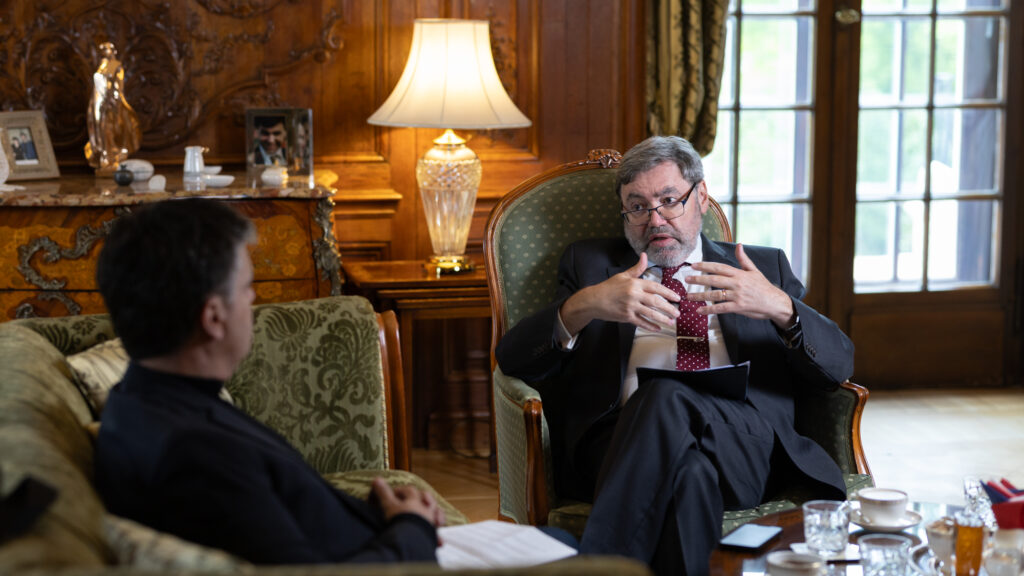
If the US is pulling out a bit from Europe, the EU needs Britain in the field of security. Is a new cooperation emerging between the major European states?
Well, I think the war helped bring Europe and the UK closer together. There will be an EU–UK summit on the 19th of May, and one of the key areas for discussion will be security cooperation. The tone of the relationship between the UK and Europe is much more positive than it has been for some time.
China is on the rise, America is trying to curb it with a tariff war, and the global South is asking for a say in global politics. How does London position itself in this changing world order?
Well, we’re still a significant nation. We are a middle power, a permanent member of the UN Security Council, a member of the G7, and we are one of the largest economies in the world. We’re one of the few countries that can project military power beyond our borders, and we are a member of NATO. When it comes to what’s happening in Ukraine, our support is unwavering, and that will remain the case. In the Middle East, we want stability and peace, and we still believe in the two-state solution. When it comes to China, I think our relationship is quite complex, because on the one hand, it’s a major trading partner of ours, but on the other hand, we have concerns about its human rights record and its behaviour in the South China Sea region. We want to cooperate with them where we can, we will compete with them where we need to, and we will challenge them where we must. There are two superpowers, and those are the US and China. But I think the international rules-based order has served us well, and the UK is fully committed to the reinforcement of that order.
How did Trump’s tariff war affect British exports and trade?
We were given the lowest level of tariffs, but there’s also a 25 per cent tariff on automotives. There’s been a moratorium on all of this for 90 days, and we’ll see what happens at the end of this period. But one of the things we’re trying to do is some sort of deal with the US, which will lower the tariffs and enhance our partnership. We are also trying to strike trade agreements with a range of partners, allies and friends, because, after all, mutual prosperity benefits everyone.
Hungary also has a strategy to position itself in the changing world, and it’s called connectivity. How do you translate it for yourself?
There is a recent term called economic neutrality. And before that, a few years ago, it was called the Eastern Opening. I can understand where Hungary is coming from as a small nation trying to navigate a very complex international environment. It wants to maintain channels with a wide range of global actors, whether it be China or America, and is trying to secure its economic interests and attract investment. But the thing is, this has to be balanced with existing commitments and obligations, because, after all, Hungary is a member of NATO and a member of the EU. It voluntarily accepted the obligations that come with membership of these organizations. In a world where there is increasing geopolitical tension, it becomes increasingly difficult to maintain an equal distance from all actors. Hungary made the decision a couple of decades ago that it saw its future in the Western Camp by wanting to enjoy the prosperity that the EU offers and accept the security provided by NATO. And given those obligations and commitments, that does impact upon the relationships with certain other countries. So, you can’t have equal distance from all countries, because, after all, you have allies.
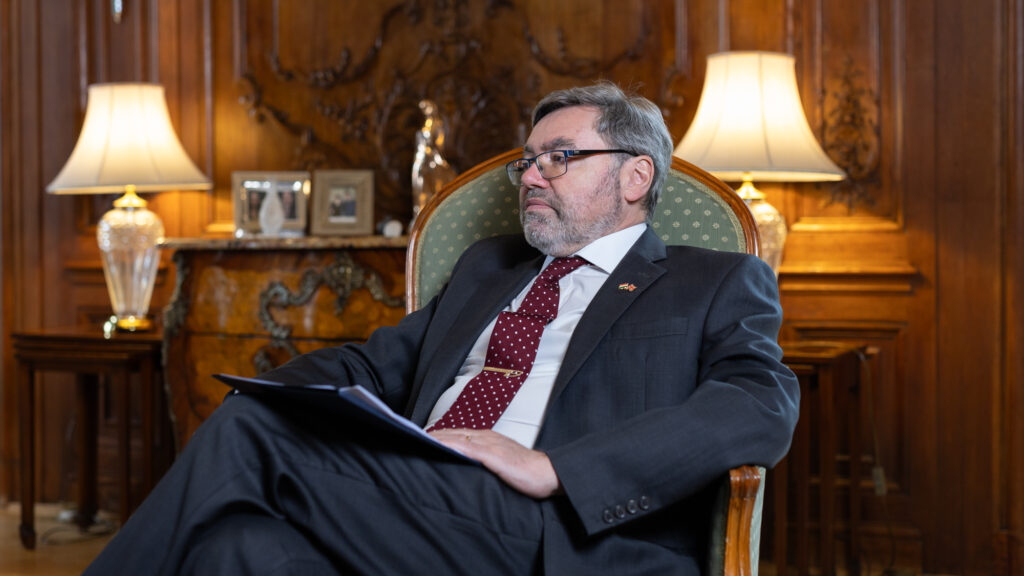
Hungary’s foreign policy has faced many criticisms from allies. But did British diplomacy understand and accept some of the arguments of the Hungarian position?
We respect Hungary’s right to pursue its own foreign policy. We may not always agree with what Hungary does, but we respect its right to act as a sovereign nation. What I’ve tried to achieve during my ambassadorship is the establishment of a framework in which we can respectfully, openly and robustly discuss each other’s points of view.
One of the ways in which we have achieved this is through the Chain Bridge Forum, a bilateral forum that kicked off in 2023 in Budapest, where we bring experts, analysts, businesses, and civil society together, and we talk about our different approaches. Where there are major points of difference, such as Ukraine, we want to sit down and, rather than lecture you, explain our point of view, but also listen to your point of view in the hope that we can perhaps influence each other’s outlooks.
David Pressman, the former US Ambassador, chose another method, and it’s so interesting to see how his successor, Chargé d’Affaires Robert Palladino, behaves now; his approach is completely different. If there is a change in administration in Washington, DC, the diplomacy and the style of the embassy change immediately. British diplomacy is different: you served under four British Prime Ministers in Budapest, but the UK’s approach hasn’t changed. Why is that?
I think there are two reasons for that. There hasn’t been a change in policy on the key issues with a change of government: Keir Starmer is a strong supporter of Ukraine, as much as Boris Johnson was. Another explanation is that the British Foreign Service is not a political service; we are career diplomats, and we serve the government of the day to the best of our ability, but we’re not political appointees. I am not political. I’m not a member of the Labour Party, and I’m not a member of the Conservative Party.
Your ambassadorial mandate expires in the fall. What successes and results do you consider important from your own five-year mission in Budapest?
I look at three areas. One area is prosperity. During my time here, the commercial relationship between the two countries has really developed. Last year, the value of trade increased to £8 billion. So, I take great pride in the fact that I’ve been able to help companies like Unilever invest in Hungary, see Tesco flourish, and see the pharmaceutical company GSK run a plant here.
I also take pride in developing people-to-people links, fostering relations with a range of civil society bodies, and making contacts between them and counterparts in the UK. In education, we’ve been working very hard to try and establish links between universities in the UK and in Hungary; we have about 3000 Hungarian students in the UK now. The British Council here is also doing a fantastic job. They are the key branch of our soft power, and they do it by teaching English, but also by being at the forefront of promoting British culture and encouraging cultural exchanges.
But if I’m proud of one aspect of my five years here, it is creating a framework, a mechanism by which the UK and Hungary can discuss in a respectful, serious and structured fashion what our views are on key issues. So, if I look back in ten years’ time, and I think if there’s anything I’m proud of, it will be the establishment of the Chain Bridge Forum.
What’s your plan for the future? What’s the next step in your career?
I will leave the Foreign Office after a long career, which has seen me serve the UK all around the world. I want to look at some new challenges. I want to stay in touch with this region and stay connected, in particular, to Hungary. If there is ay region that has my affection, it is Central Europe, and if any country has my affection, it is especially Hungary. So, I will maintain this relationship, whether it be through think tanks, academia or the like. We’ll see.
Related articles:

